Two years ago, I got to see the film When Men Were Men at the Austin Film Festival, and it was such a cathartic and validating experience – one which I then got to revisit when I interviewed the filmmakers last year for Incluvie.
Because of this, I began to see AFF as an event that had the potential to provide a space for queer creators to share their stories and find an audience for their work. A place to cultivate queer kinship and celebrate the power and beauty found in queer storytelling.
And this year was no exception, as there were several instances throughout the festival that showcased the many ways in which the queer experience is a singular one, with so many diverse, awkward, wholesome, heart-wrenching and exciting stories just waiting to be told.
A Special Moment
Before I get to the films themselves that speak to this, I want to begin this piece by relaying an unexpected instance of queer affirmation that occurred during the Q&A after a panel.
The topic of the panel was “Beyond Badass,” examining how the quagmire of the female character has evolved in recent years, particularly in light of Barbie’s success. The panel itself was great, with lots of insights from Lindsay Doran, Michael Arndt, Karyn Kusama and Phil Hay, all of whom know a thing or two about writing well-rounded female characters.
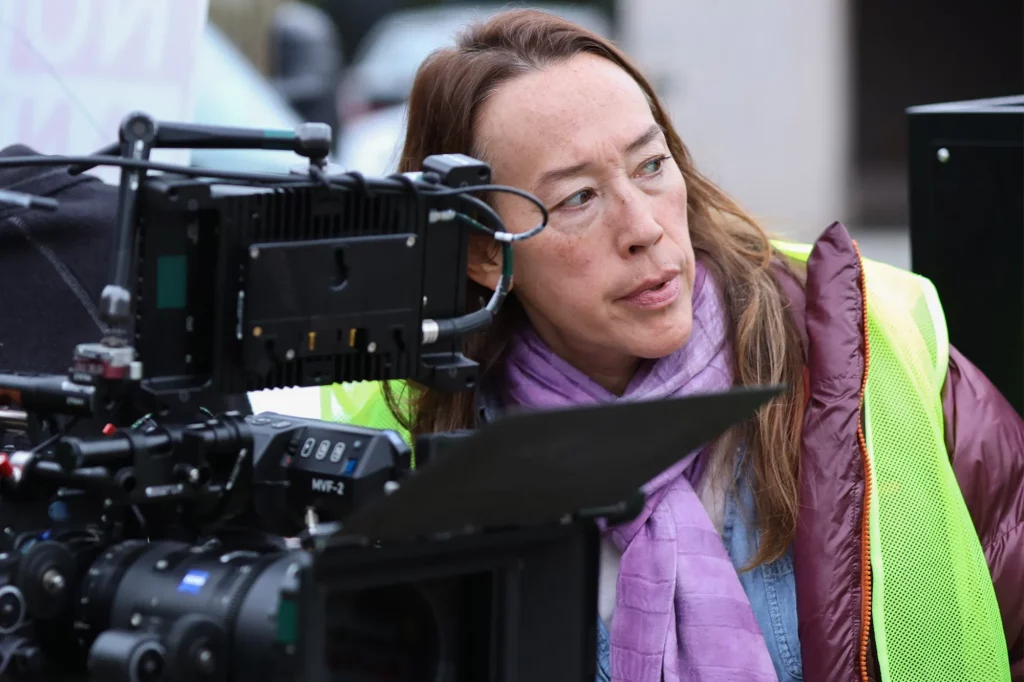
However, there was a query made during the Q&A which took the discussion in a slightly different direction, when Eros Palmer asked the panelists for their thoughts on how the uptick in non-binary representation on screen factors into the conversation.
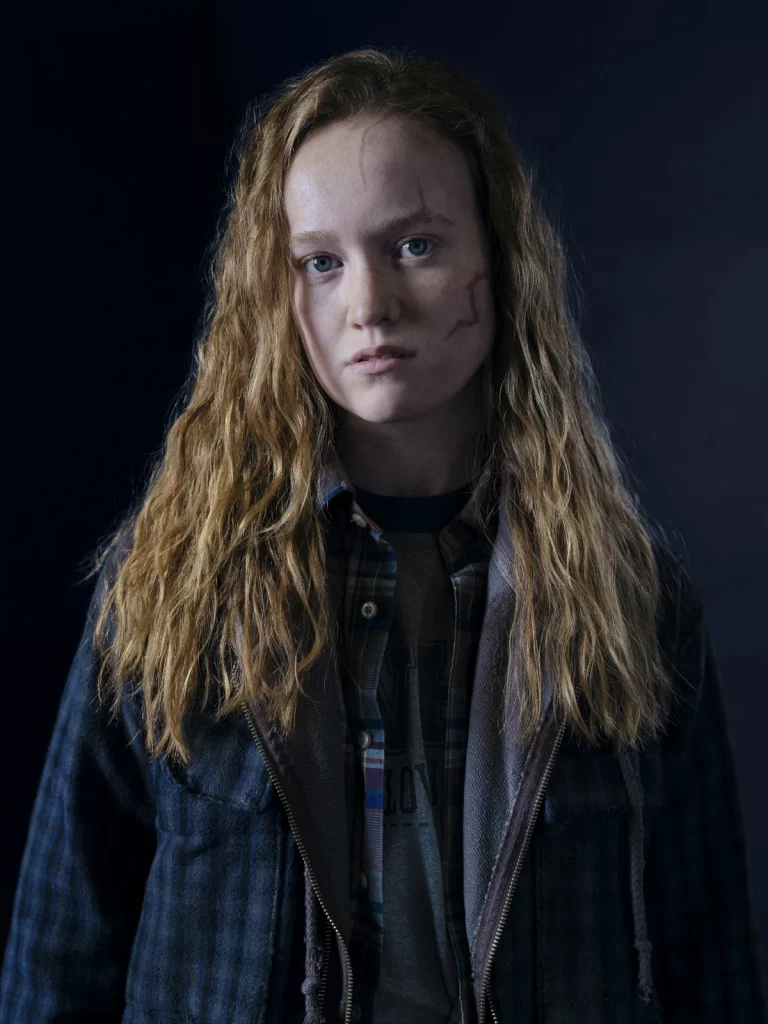
They referenced Liv Hewson’s role in “Yellowjackets” – which is an example of a non-binary performer playing a cis gender character – and Kusama shared a few nuggets about the process of working with Hewson to bring that character to life.
What I really appreciated, however, was what Michael Arndt had to say in response. He decided to take the macro perspective and applaud how wonderful it was that we are at a bit of an inflection point in our industry, where we get to reframe and rethink our approach to gender in order to maximize inclusion. Several times, he referred to it as an “open playing field,” and he seemed so genuinely excited by the prospect of navigating that new territory. It was encouraging to see his delight and enthusiasm.
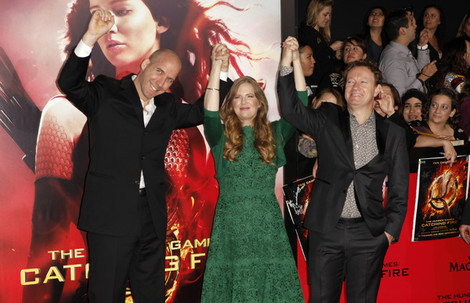
And the next person who asked a question posed a follow-up of sorts, asking for advice as to how to help enby (non-binary) or GNC (gender-non-conforming) kids who are just getting into writing and who don’t see their stories reflected in media. I felt so lucky to be in the room when this conversation was happening, to hear from industry professionals who have the platform to move the needle expressing so much interest and intention in doing so. It gave me so much hope for Hollywood and our world in general.
Sometimes, it feels like we’re fighting a losing battle, or that the only ones fighting are those within the community. So this was a very welcome conversation, and I made a point of thanking Palmer after the Q&A (which was also when I got their permission to name them in this piece).
Okay – Onto the films…!
(Spoilers ahead)
Queer Titles
All Of Us Strangers
Written and Directed By: Andrew Haigh
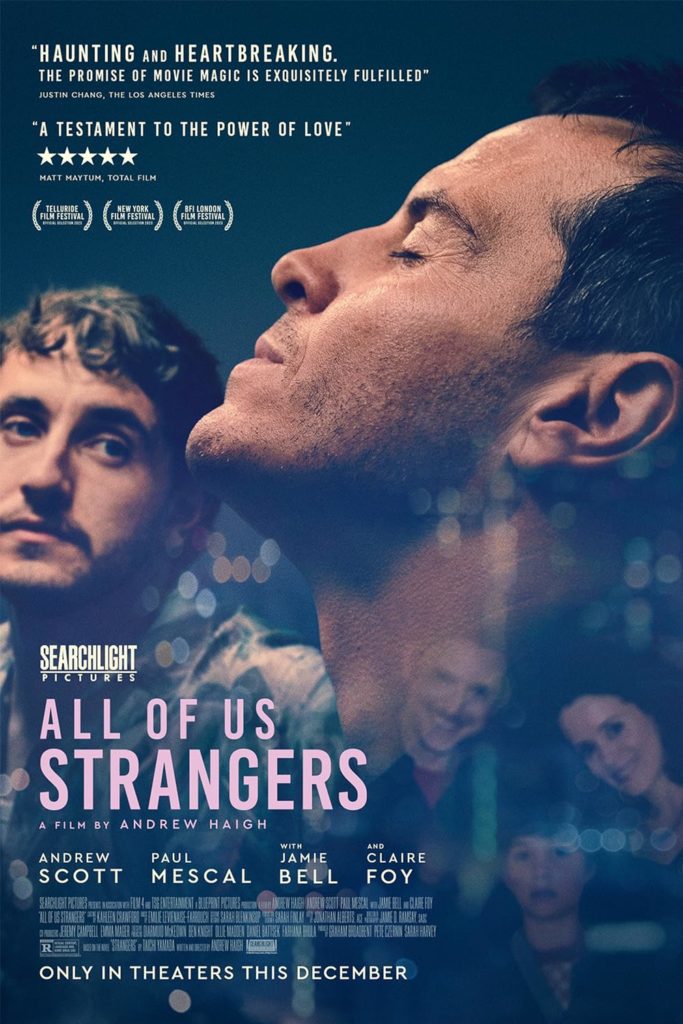
Simultaneously heartwarming, heartbreaking, incredibly affirming, and impressively raw, Alexander Haigh’s latest film presents one of the most intriguing and haunting “what if?” narratives in recent years, led by a stellar cast: Andrew Scott, Paul Mescal, Claire Foy, and Jamie Bell.
In All Of Us Strangers, the always sensationally captivating Scott gives one of his most intimate performances to date, as Adam, a gay man who is struggling to live as his full self, due to a fragmented upbringing that saw him orphaned at the age of 12. In the midst of writers’ block, Adam stumbles upon a remarkable second chance, when he visits his childhood home and finds his parents (Foy and Bell) alive and well, preserved as they were in the days leading up to their fatal car accident.
Haigh’s take on this magical realistic concept is quite enticing, as it’s not a time travel movie in the typical sense – adult Adam is welcomed into his parents’ house as he is, almost as though he’s just been estranged from them for a few decades. It takes a second for the audience to catch onto the true magic of what is happening in the story, and that allows for the narrative to feel more real, and makes the interactions with the parents even more genuine. Once we’ve accepted the quasi-supernatural circumstances, it is easy to invest in the scenario that is playing out, and this is due to Haigh’s brilliant script and direction. It doesn’t operate like a fantasy film, and that grounds us in a needed reality to be able to fully empathize with the healing Adam is undergoing.

For any queer person watching the film, especially those who were late bloomers, the film resonates on a deeper level, as we are watching Adam come out to his parents, who never got to know his true self. This is a true gift – the opportunity for your loved ones to know the real you – and Haigh explores it with such delicacy and intention.
For one thing, Adam is not immediately accepted. His mother takes some time to come around, says the wrong thing, sits there in denial, etc. But she doesn’t shun him. It’s not some melodramatic scene – just an authentic reaction to the reveal. Here again, it feels like Adam has been estranged from her and is reconnecting, rather than the notion that he’s talking to a ghost.
And when he comes out to his father, he gets a different kind of raw response, as his father basically implies that he knew and decided not to address it. He actually gets an apology and a hug and it was so moving to see that kind of paternal love showcased. You can see both men sobbing due to the lost time, the lack of communication, and the relief at being able to be open with each other. And when Adam looks in the mirror and you can see his father hugging little Adam – yeah, that got the waterworks going.
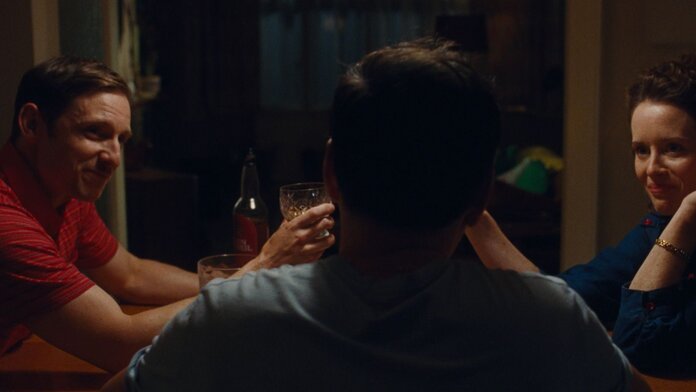
In addition to the storyline between Adam and his parents, there is a parallel plot happening in the real world, with his new boyfriend Harry (Mescal). This arc is equally delicate, as we can see that Adam is somewhat new to romantic relationships and Harry is so gentle with him. The two have these very personal conversations about their own journeys – encountering homophobia, what their families are like, etc. It’s wonderful to see that Adam has someone to talk to, that after years of feeling so alone, so isolated, he finally has queer community. It is so important to be able to have people in your life who can speak to your experience. Queer conversation is so nuanced, and hearing them discuss these topics provided such a needed inclusion, both for Adam’s journey of self-discovery in the film, and for the queer audiences who so rarely get to see these kind of exchanges on-screen.
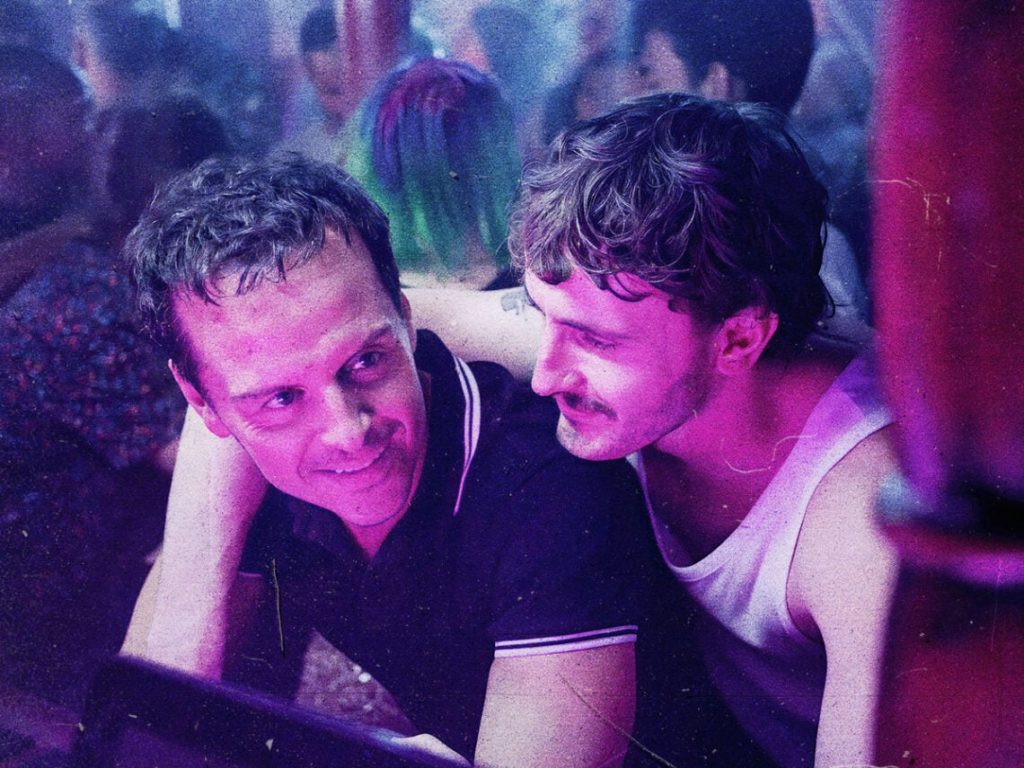
Unfortunately, the fantasy can’t last, and Adam soon finds it difficult to visit the past and live in the present, causing him to lose Harry because he is so caught up in relishing his time with his parents. It’s a tragic ending, only made slightly sweeter by Adam getting one last night with his boyfriend, due to the supernatural storyworld he lives in.
Egghead & Twinkie
Written and Directed By: Sarah Kambe Holland
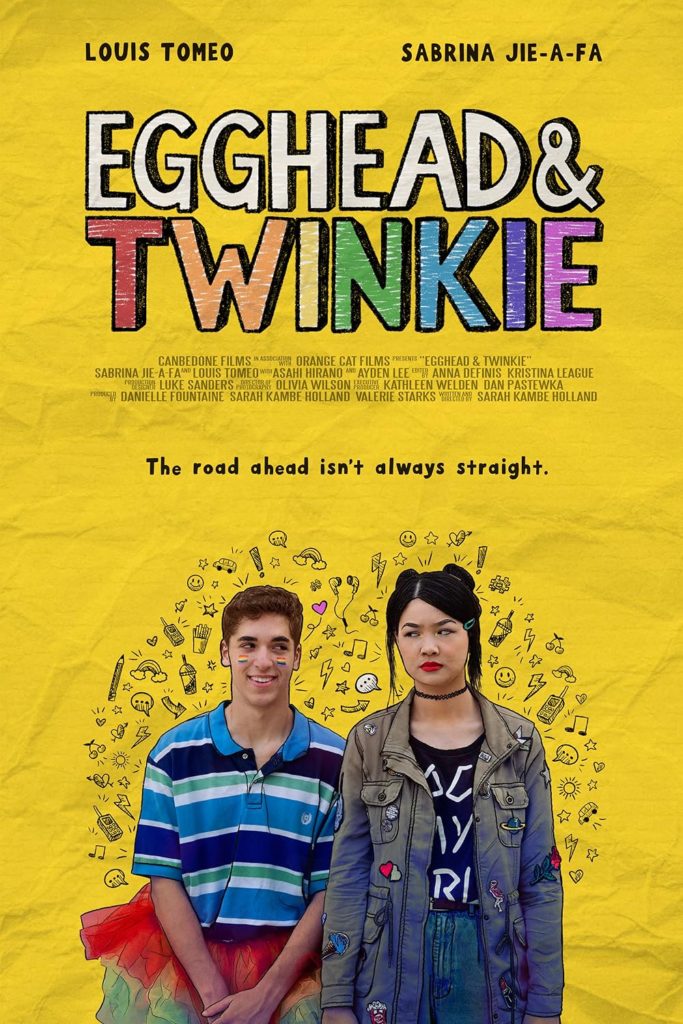
I adored this movie, from its vibrant and playful aesthetic, to the way it captures the complicated nature of both friendship and allyship, and of course, to its well-executed exploration of the journey to understanding oneself.
To be honest, I was hooked from the first moment I read the synopsis for Egghead & Twinkie, so ready to see this zany buddy comedy featuring a nerdy queer Asian teen as the lead. AFF is no stranger to narratives that depict the complexity of the gaysian coming-of-age experience, and Sarah Kambe Holland does a wonderful job of exploring the intersectionality in that in her directorial debut.
As I was waiting in line to watch the film, I learned that it had won the Comedy Award at the festival, and that got me even more hyped to see it. It was heartening to know that this little queer indie comedy had made an impact on others.
In her intro, writer-director Holland gave credit to Gen Z and TikTok for helping to crowdfund the project. Knowing that this was such a grassroots success intensified my excitement, as this was truly a group effort, backed by so many people who believed in the power of this cute little queer narrative. I love seeing a passion project come to fruition. And it made it all the more impressive when I witnessed the stunning production value of the picture, which followed the well-worn path of other teen comedies like Juno in combining live action with cartoon drawings to establish a unique aesthetic and tone.
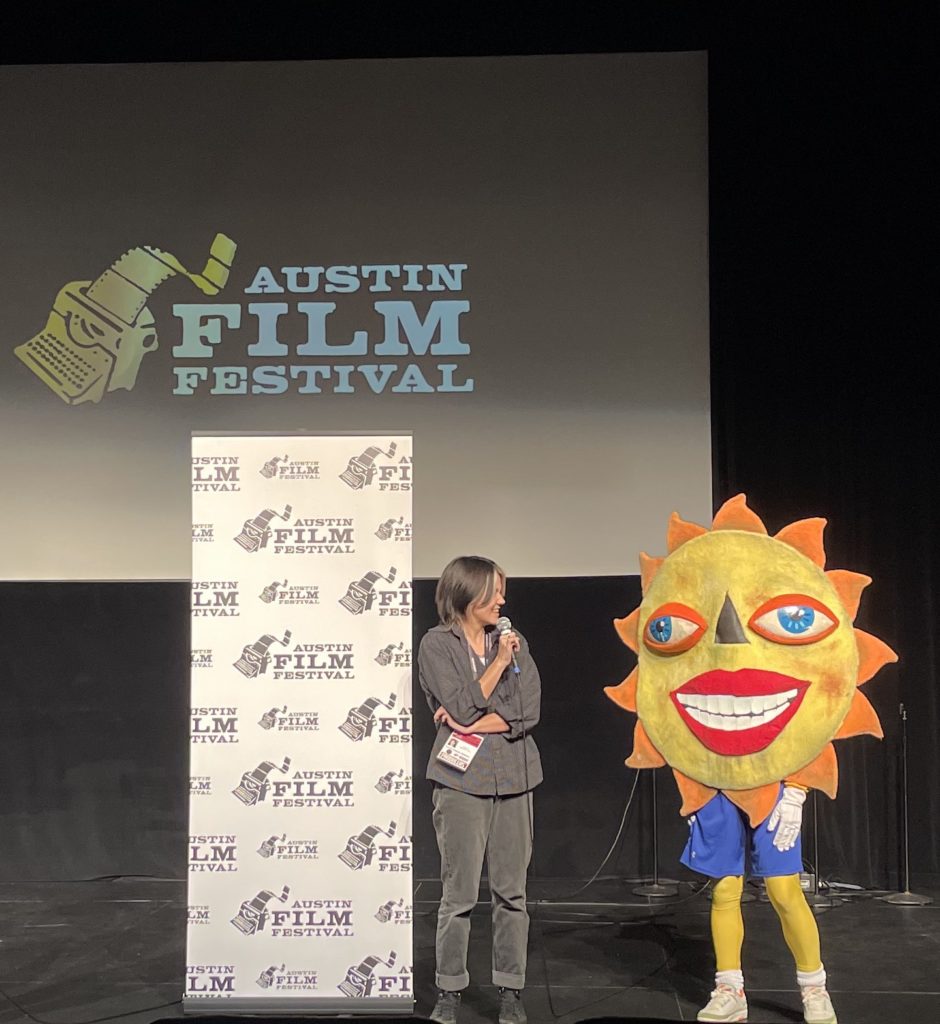
Within the film, there are three queer characters, each of whom has their own vibe and energy. We have our protagonist, Twinkie, her crush, B.D., and a new friend, Jess. Let’s examine each in turn…

The film’s protagonist, Twinkie (Jie-A-Fa), is very very newly out and still navigating what that means for her – where she fits into the community – and she is feeling a lot of imposter syndrome about the whole thing. She is also adopted, and I appreciate the way that aspect of her identity is explored as an added layer to her journey in the narrative. She’s spent most of her life not fitting in, which leads her to feel even more pressure to find a home amongst B.D. and her crowd.

B.D. (Lee) for her part is a complex antagonist, as she does genuinely seem to want Twinkie in her life, but isn’t on the same page as far as how to define their relationship. The film does a good job of showcasing the way a lot of queer people find their community in a virtual space, and how those bonds may not be as solid or dependably authentic as one might hope. There’s an important message in this narrative about the difference between online connections and real in-person ones, how placing quasi-celebrities on a pedestal is unfair to both parties. This takeaway alone makes the film incredibly current and accessible to today’s audience, and you can see the influence of Gen Z in that core conflict.
Last but not least, we have Jess (Hirano), a friend Twinkie makes along her travels, and the one the audience knows she should end up with. What I love about Jess is that she is very much just unabashedly herself. The chemistry she has with Twinkie is organic, moving from fast-friends to something deeper without a lot of fanfare. She never plays games with Twinkie and never pressures her to do or be anything that makes her uncomfortable. She is nurturing and very open about her own journey. And their shared Asian heritage adds another connection point for the two to converse about, which gives Twinkie a safe space she really hadn’t had access to previously.
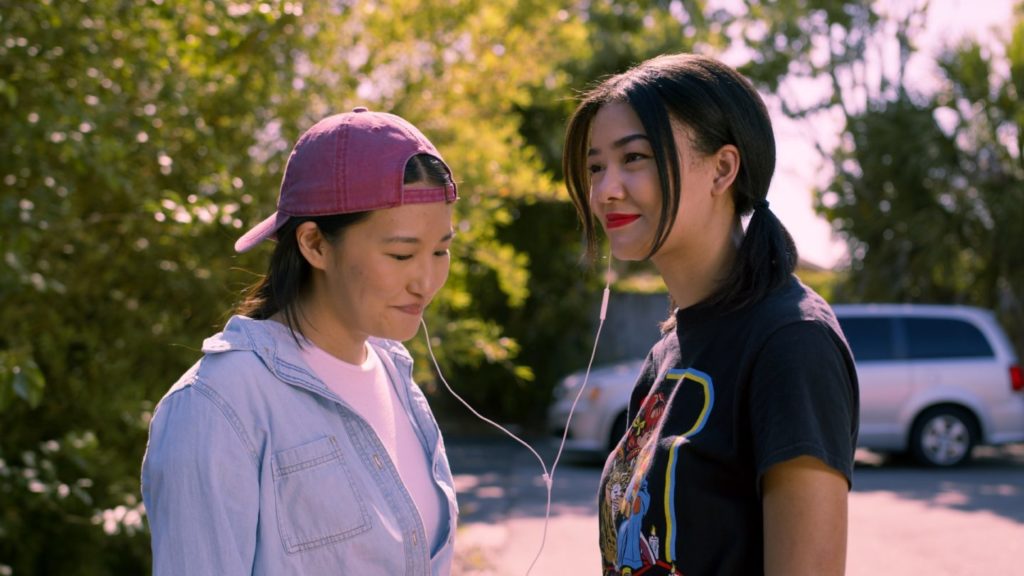
All in all, this was such a joyous depiction of self-discovery, with a loving platonic bond at its core. It’s the kind of narrative that shows the messiness of trying to come to terms with who you are, who you want to be, and how having real true friends can make that journey slightly less terrifying.
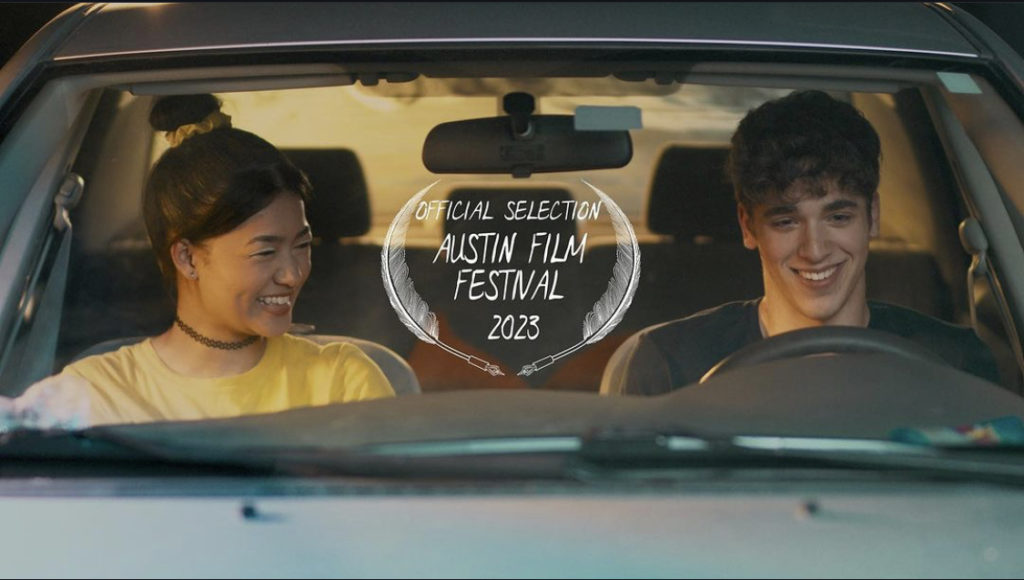
As a final note, I want to say that I appreciated the role Egghead (Tomeo) played in the piece. He wasn’t just a sidekick or some plucky comic relief character. He had his own arc toward understanding how he could be the right kind of ally, without making the whole thing about him and his response. Ultimately, this is Twinkie’s story and Egghead had to get over his own feelings in order to be there for her. He figured out when to listen, when to gently admonish and direct, and when to take a step back to just let his friend be. There aren’t enough films that illustrate this side of the story, and certainly very few that do so with this amount of comedy, intentionality, and genuine affection. This approach illustrates the real lived experience that inspired Holland’s story.
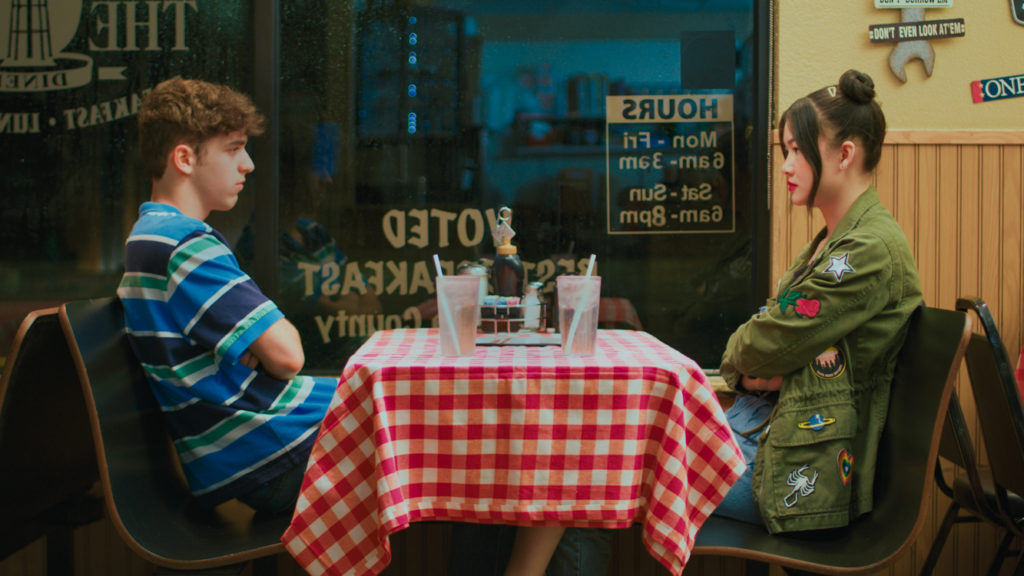
One of the film’s taglines is: “Based on a real roadtrip,” and you can tell this writer knows what her titular characters are going through, because she pulled this narrative from her own life. And that makes it hit home in a different and far more impactful way.
“Los Angelez”
Written and Directed By: Louisa Hill
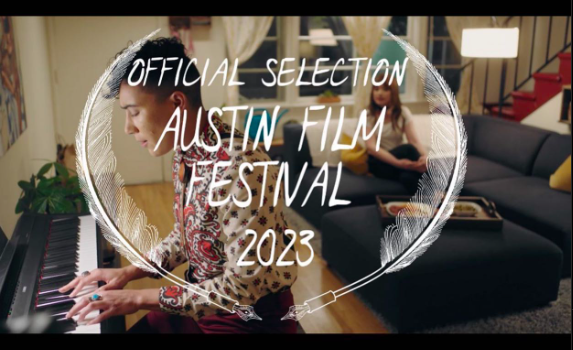
Late-blooming queer folks will relate almost too much to the anxious protagonist of this digital series. From her first interaction with the delivery person, to the fashion montage of outfits our timid lead is trying on in order to “look queer” for her first date with a woman, there were so many authentically awkward moments here.
The theme or ongoing question of “can/will I fit in with the rest of the community?” permeates the episode, subliminally punctuating almost every scene; especially as Amelia encounters a seemingly endless array of queer characters who all seem to be interconnected, and all of whom have some sort of history with Jordan, her date.
There was this undercurrent of imposter syndrome that almost hit too deeply, and definitely allowed the viewer to invest in the main character’s plight. As we watch her become steadily insecure throughout the events of the evening, the fact that the episode ends with her at her ex-boyfriend’s house highlights the potency of her struggle. Yes, it’s a comedy, but that inability to find your place in the community, to continue to step forward in your journey, provides a layer of vulnerability and rawness that sobers the humor a bit.

This is a story about a woman trying to come to terms with who she is and how she wants to move in the world, and that is a rollercoaster of ups as well as downs, one which is explored beautifully here. Even though this is just the first episode, there is so much foundation for where these characters’ arcs could lead, how lives could intersect, etc. I hope the creators find distribution for it, because I’m excited to see more!
Other Titles (not overtly about the queer experience, but featuring LGBTQIA+ characters and storylines)
Saltburn
Written and Directed By: Emerald Fennell
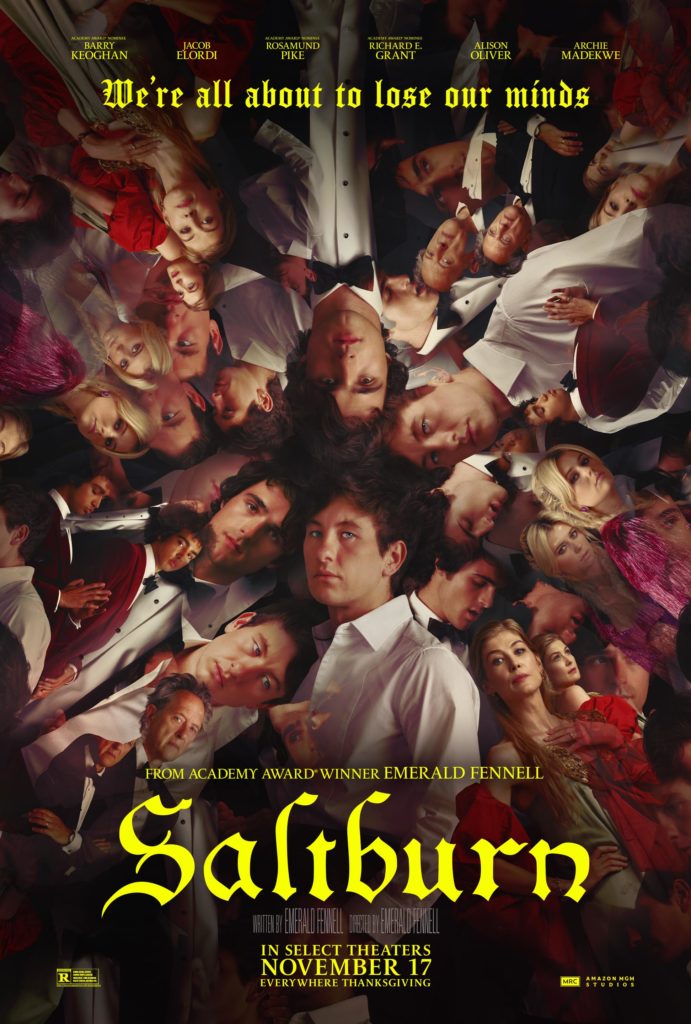
Emerald Fennell’s truly twisted tale of obsession and desire is not for the faint of heart, and, quite frankly, not exactly my genre of movie. But there is no denying her skills as both a writer and a director.
Saltburn is quite visually stunning, with vibrant colors that capture the luxury and excess of the setting, not to mention the tonally perfect lighting that pulls you right into the storyworld, in the same way her Oscar-winning directorial debut Promising Young Woman did.
Fennell is definitely making a name for herself with this second feature, leaning even further into taboo subject matter without concern for how polarizing the narrative will inevitably be.
As the opening night film at the festival, Fennell herself was in attendance for a post-screening Q&A, and the first question she was asked was something to the effect of “What is it like in your brain?” – a worthy query after watching a film that makes The Talented Mr. Ripley look tame.
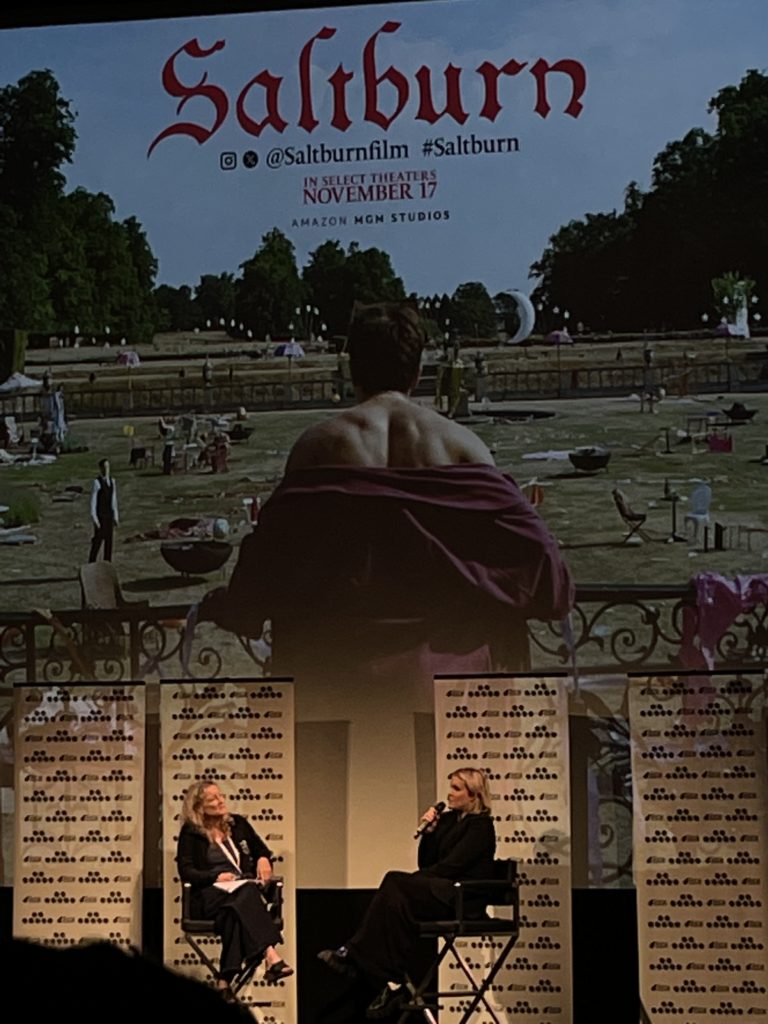
Even though this is only her second outing, I can already say that one of Fennell’s biggest strengths is assembling a talented cast. There was not a weak link in the group, but Barry Keoghan just owned this movie. Every layer of Oliver that was slowly revealed only gave Keoghan more opportunities to shine. He was convincing as both the meek, undervalued, sympathetic schoolboy, and as the truly terrifying and deranged psychopath. And all the carefully constructed personalities that exist between the two poles.
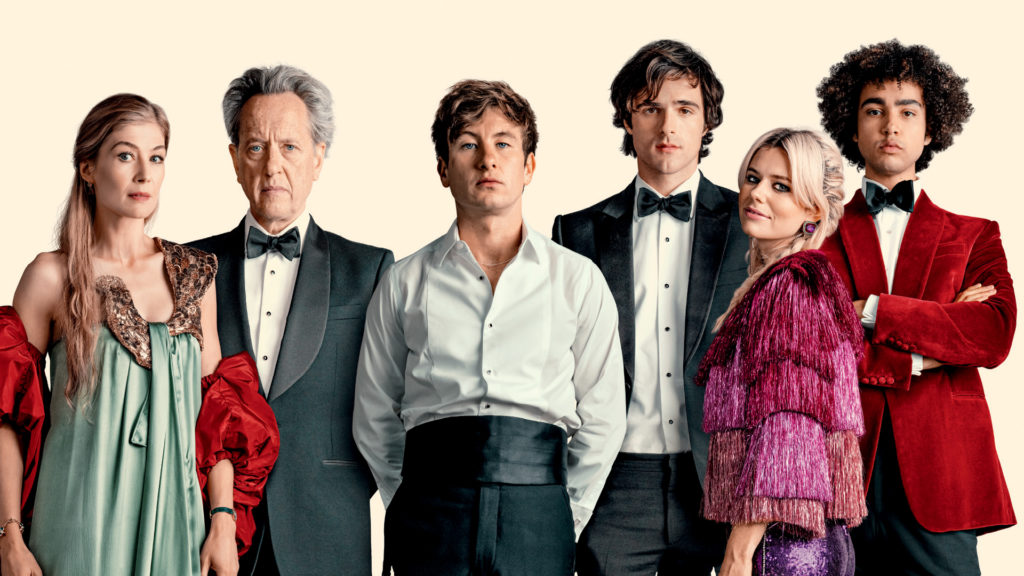
But the largest through-line was his lust for Felix. I wouldn’t even say that Ollie is strictly gay, but rather fluid in his sexuality, which is also something rarely explored in media. It’s less about defining that aspect of his character’s identity, and more about just the general, unquenchable desire he is trying to satisfy. His queerness is just there, not a negative or a positive, and there is something refreshing about that.
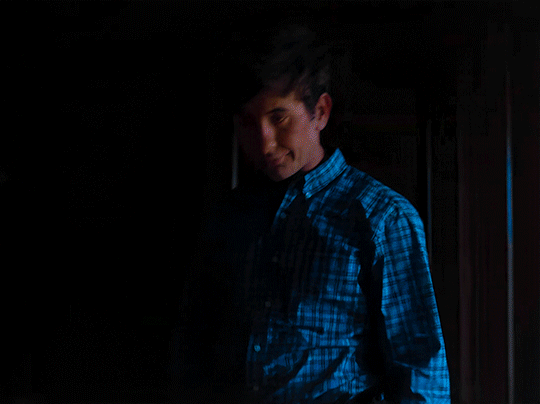
And this desire, though clearly a factor in all of the death and destruction that ensues, is also something that has its moments of relatability. Both Fennell’s script and Keoghan’s performance make it impossible to not find sympathy for Ollie, even though his heinous acts are truly disturbing.
“ACT of Faith”
Created By: Kyle Reid Hass, Dana Norris, Jeremy Swanton
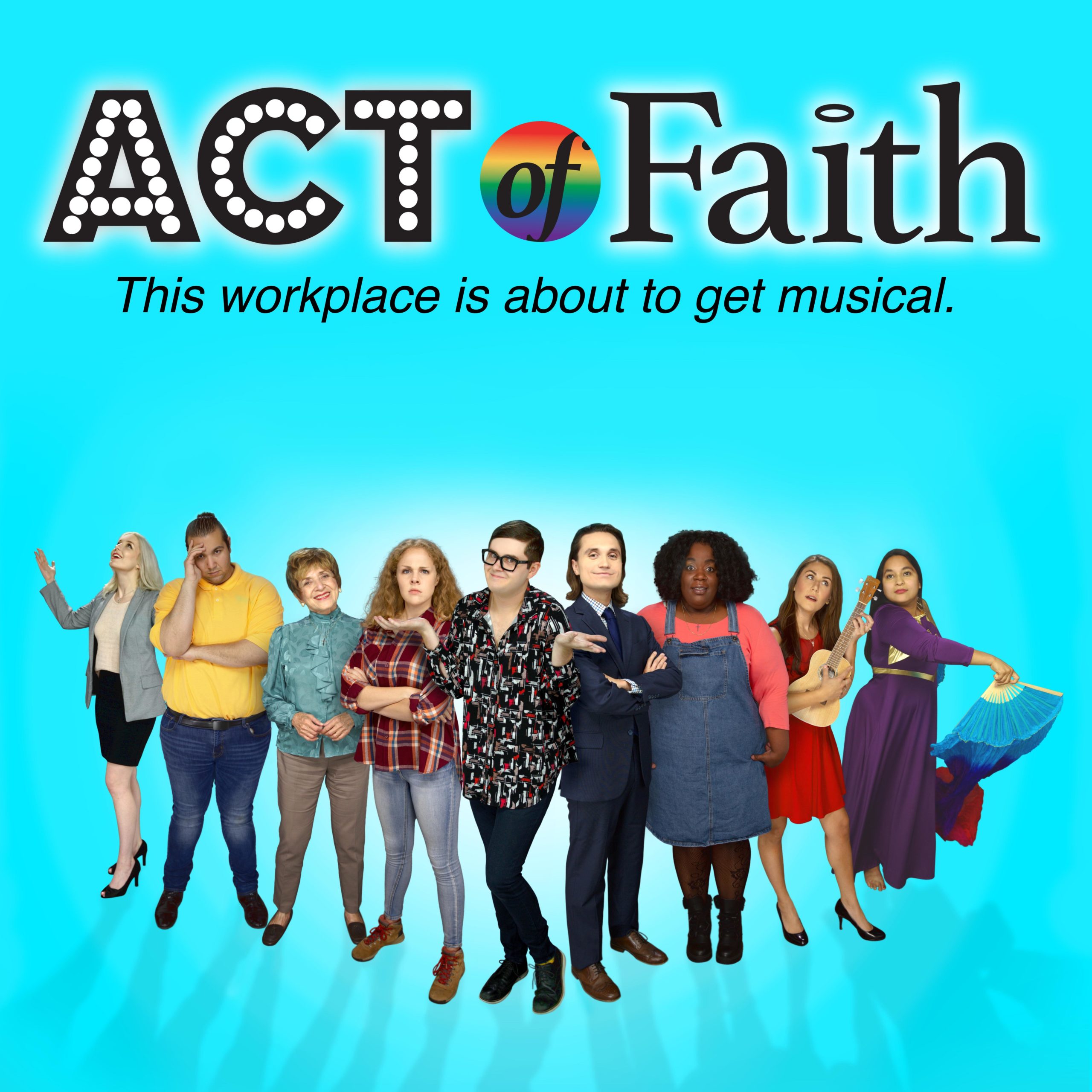
As someone who grew up going to church every Sunday and youth group every Wednesday, this hilarious show struck just the right chord.
The mockumentary style of filmmaking has been employed in several workplace comedies; however, setting this series inside the walls of a faith-based theatre company offers an all-too-accurate look into the zany and singular storyworld that exists there.
Watching these not-that-exaggerated personalities being celebrated on-screen gave me an unexpected sense of affirmation. The creators of the series seem to be drawing straight from their own lives, and thus have tapped into an as yet to be properly showcased demographic: youth group-loving theatre kids. There is a specificity in that which will uniquely appeal to those who share that space, but the authenticity and the details in these characters will give even those who don’t directly relate to that lived experience a glimpse into what it’s like. At a time when the only options for religious narratives seem to be open mockery (“Book of Mormon”) or way-too-conservative-and-campy-to-be-taken-seriously by Christians/for Christians types of films, it was nice to see this tonally different approach to that storyworld.
The show captures almost every branch on the family tree that might be found in a group of young adults working in this kind of religion-focused space – from the die hards, to the try hards, to the slackers, and all the way to the queer Christians who have a somewhat complicated relationship with their faith.
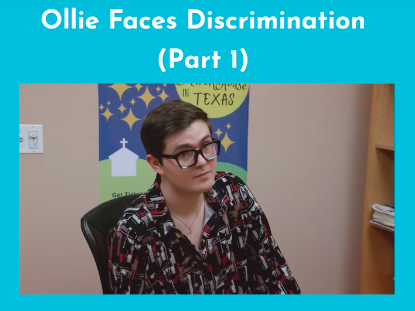
Watch a clip: https://www.facebook.com/reel/1432238734026039
I loved that the show took a moment to get real and grounded about this, that it didn’t shy away from the conflict that exists for Ollie (Kyle Reid Hass) as he pursues his theatrical dreams. In fact, the concept of a “pink scare” became an important story beat and an unanticipated connection point for the characters.
I’m intrigued to see how it will be further explored as the series develops.
Don’t Tell Larry
Written and Directed By: Greg Porper and John Schimke
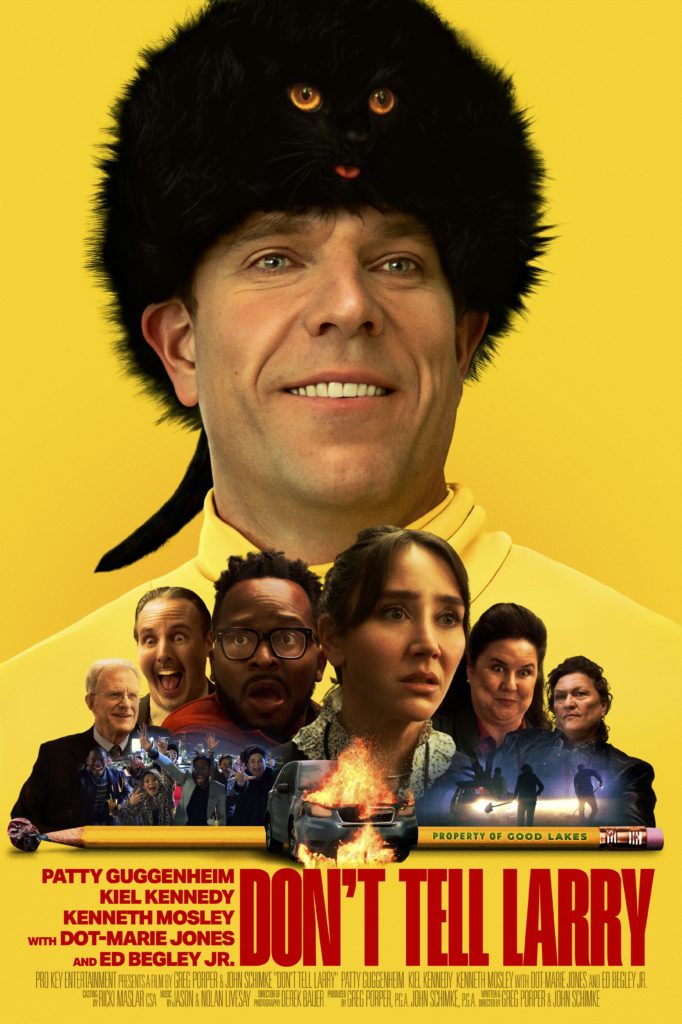
One other film with unexpected queer representation was Don’t Tell Larry – a workplace comedy turned thriller, which featured a canonically queer woman (Susan) as one of the leads.
This was another scenario where the character’s queerness is just part of who she is, with a few lines of dialogue to confirm it, as well as an almost kiss. It’s treated like a matter-of-fact character detail, while also being played for laughs when we learn that the wife of her ex is the detective on the case where she’s trying to cover her tracks.
(In addition to this, there is a sequence where Susan has to seduce a guy as a distraction, and the fact that we know she dates women adds a layer of humor to that whole interaction, especially when she kisses him.)
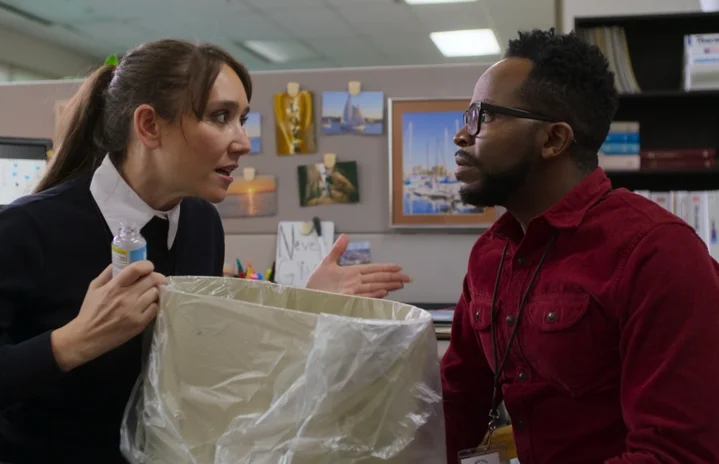
Aside from this queer inclusion, the film also does a great job of showcasing a diverse workplace, one which resembles what the office of today looks like. It doesn’t just check boxes for the sake of doing so or appearing woke – it simply allows its storyworld to reflect our own. By virtue of understanding office politics and the organic conflicts created by living in a patriarchal society built on systemic racism, having the film’s co-leads be a queer woman and a Black man (Patrick) just fits the narrative. And it should be noted that this is basically a story about a woman who has earned the top job and now has to fight against nepotism and misogyny to get what she deserves. A very timely, almost too zeitgeist narrative, encased in a farce that leans steadily into horror.
This is not a movie about a queer woman understanding her sexuality. It’s a farcical cautionary tale about how ambition can spiral into unnecessary death and destruction, along with a reminder that you should just invite that weird coworker to the surprise party. And I kind of love that it exists in a space where things like sexuality, race, etc. can be inclusive without being the focal point of the story.
My Takeaway
Queer creators are continuing to pave the way, leading by example to show newer writers and filmmakers that there is in fact not just a space for their stories, but a need for them. And it was heartening to find visibility and representation for LGBTQIA+ characters outside of strictly queer media, to know that even those who are not within our community understand the impact and importance of including queer storylines in their work. The more we see ourselves reflected in media, the more we can celebrate the validity of our own existence, in all the beautifully messy forms it takes. The queer experience is by no means a monolith, and I’m glad to see AFF embracing that.
Looking forward to what next year’s festival has in store!
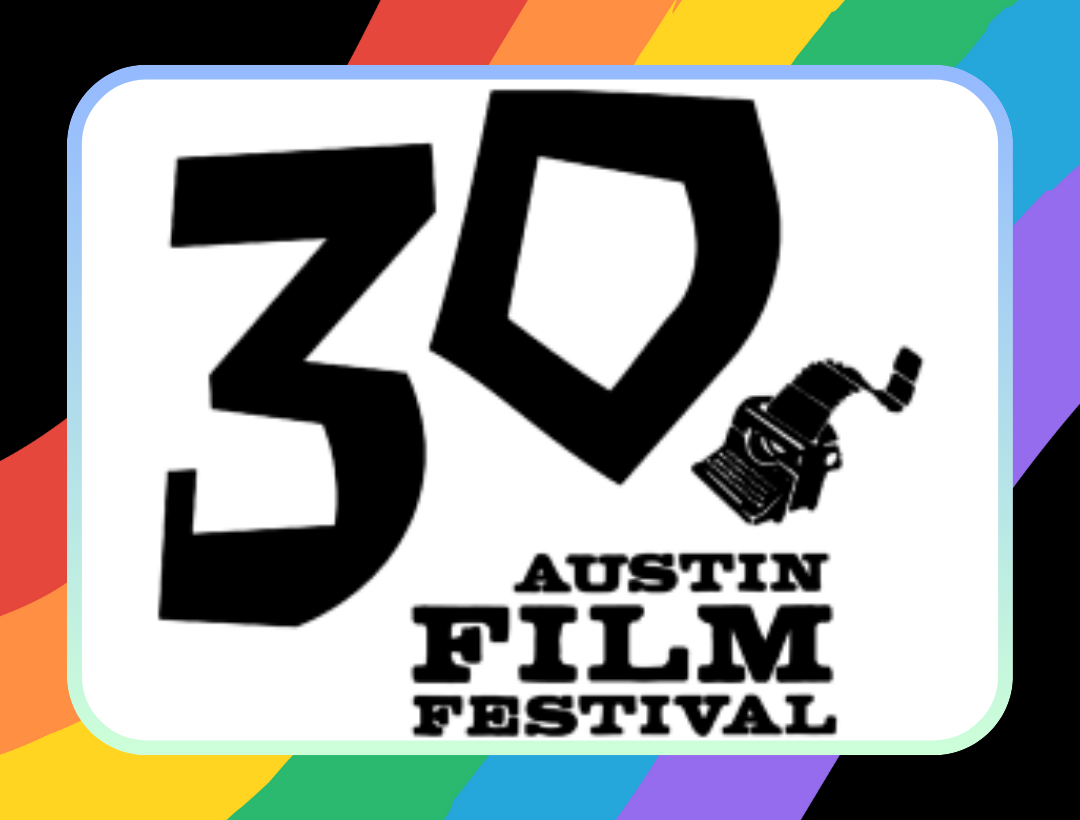
Comments